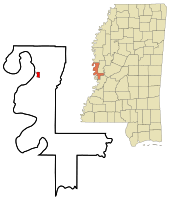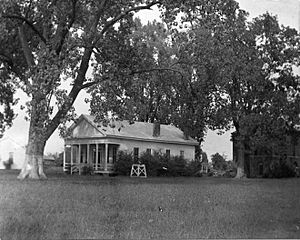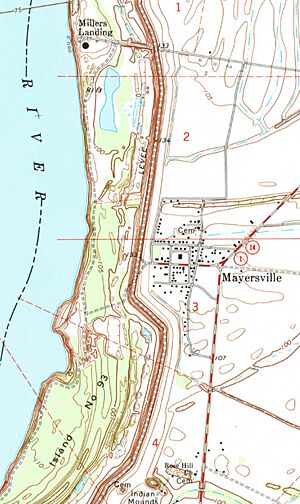Mayersville, Mississippi facts for kids
Quick facts for kids
Mayersville, Mississippi
|
|
|---|---|

Location of Mayersville, Mississippi
|
|
| Country | United States |
| State | Mississippi |
| County | Issaquena |
| Area | |
| • Total | 1.10 sq mi (2.85 km2) |
| • Land | 1.10 sq mi (2.85 km2) |
| • Water | 0.00 sq mi (0.00 km2) |
| Elevation | 102 ft (31 m) |
| Population
(2020)
|
|
| • Total | 433 |
| • Density | 393.28/sq mi (151.82/km2) |
| Time zone | UTC-6 (Central (CST)) |
| • Summer (DST) | UTC-5 (CDT) |
| ZIP code |
39113
|
| Area code(s) | 662 |
| FIPS code | 28-46000 |
| GNIS feature ID | 2406112 |
Mayersville is a small town in Mississippi, United States. It sits on the east bank of the Mississippi River. It is also the main town, or county seat, for Issaquena County.
Mayersville is located in the Mississippi Delta region. This area was once famous for growing a lot of cotton before the American Civil War. The town used to be an important trading spot. However, its importance changed when railroads were built in other areas. In 2020, about 433 people lived in Mayersville. Most of the people living there are Black.
Contents
History of Mayersville
People have lived in the Mayersville area for a very long time. Native Americans were here even before recorded history. The Mayersville Archeological Site is a special place. It was added to the National Register of Historic Places in 1980. This site has the remains of earthwork mounds. These mounds were built by the Mississippian culture between 1200 and 1400 AD.
Ancient Mounds and Early Settlements
In 1950, a survey found eleven ancient mounds at the site. Over time, some of these mounds were damaged or destroyed. Three of the mounds once surrounded a large open area, like a town square. One mound, called Mound I, was used again between 1400 and 1600. This might have been by the Choctaw people. Later, a family cemetery from the 1800s was built on one of the mounds.
The first non-Native American settlement was in 1830. A European-American named Ambrose Gipson bought land along the Mississippi River. He started a place called "Gipson's Landing." This spot quickly became a busy port. Cotton from Issaquena and Sharkey counties was shipped from here. River workers, traders, and even show boats visited the landing.
Founding and Growth of Mayersville
David Mayer owned a nearby plantation. His shipping records show that goods were sent from this port by steamboat. They went to places in Arkansas, Louisiana, Missouri, and Mississippi. In 1870, David Mayer bought Gipson's Landing. The town of Mayersville was officially founded in 1871. The state government made it the county seat for Issaquena County in 1872.
Challenges and Changes
In January 1885, there was tension in Mayersville. Rumors spread about a Black saloon keeper named Ebenzer Fowler. An armed group of white men confronted him. This led to a tense situation. The county sheriff called in a militia group from Vicksburg to help calm things down. The militia left the next day when the tension eased.
Mayersville's importance as a shipping port began to decrease in the mid-1800s. This happened because new railways were built across the South. Even though no railway came directly to Mayersville, other towns with railways became more important.
A huge flood in 1927, called the Great Mississippi Flood of 1927, caused a lot of damage. After the flood, a large protective wall, called a levee, was built. This levee cut off the town's direct access to the river. This made the town's decline even worse. Today, a large grain port run by Bunge North America is located north of Mayersville. The current county courthouse in Mayersville was built in 1958.
Civil Rights and Modern Mayersville
In the mid-1960s, new laws allowed African Americans to register and vote again. In 1976, a famous civil rights leader named Unita Blackwell was elected mayor of Mayersville. She was the first African-American woman to become a mayor in Mississippi.
Mayersville today is much smaller and quieter than it was in its busy port days.
Geography of Mayersville
Mayersville is located in the northern part of Issaquena County. It is just east of the Mississippi River. A levee separates the town from the river.
Roads and Connections
Mississippi Highway 1 goes through Mayersville. This highway leads north about 39 miles to Greenville. It goes south about 22 miles to U.S. Route 61 at Onward. Vicksburg is about 53 miles south of Mayersville. You can get there by taking Highways 1 and 61.
Mississippi Highway 14 starts in Mayersville. It runs northeast with Highway 1 for a bit. Highway 14 then goes east about 11 miles to US-61 at Rolling Fork.
Town Area
The United States Census Bureau says that Mayersville covers a total area of about 2.9 square kilometers (1.1 square miles). All of this area is land.
Population and Demographics
| Historical population | |||
|---|---|---|---|
| Census | Pop. | %± | |
| 1880 | 355 | — | |
| 1900 | 250 | — | |
| 1910 | 185 | −26.0% | |
| 1980 | 378 | — | |
| 1990 | 329 | −13.0% | |
| 2000 | 795 | 141.6% | |
| 2010 | 547 | −31.2% | |
| 2020 | 433 | −20.8% | |
| U.S. Decennial Census | |||
2020 Census Information
The 2020 United States Census counted 433 people living in Mayersville. There were 155 households and 66 families in the town.
| Race | Number | Percent |
|---|---|---|
| White | 34 | 7.85% |
| Black or African American | 292 | 67.44% |
| Native American | 1 | 0.23% |
| Asian | 1 | 0.23% |
| Other/Mixed | 2 | 0.46% |
| Hispanic or Latino | 103 | 23.79% |
Recent Population Trends
In 2013, the American Community Survey estimated 652 people lived in Mayersville. This was a decrease from the year 2000. The population has become mostly African American. About 90.2% of the people were African American, and 9.7% were White. A small number were from other races or were Hispanic/Latino.
Education in Mayersville
The schools in Mayersville are part of the South Delta School District.
Notable People from Mayersville
- Unita Blackwell, a leader in the civil rights movement. She was mayor of Mayersville from 1976 to 2001. She was the first African-American woman mayor in Mississippi.
- Hazlewood Power Farish, a Mississippi state senator from 1908 to 1912.
- William Stamps Farish II, who was the president of Standard Oil.
- Anthony Harris, a professional football player who played as a defensive tackle.
- Elza Jeffords, a U.S. Representative from Mississippi's 3rd congressional district from 1883 to 1885.
See also
 In Spanish: Mayersville para niños
In Spanish: Mayersville para niños
 | Lonnie Johnson |
 | Granville Woods |
 | Lewis Howard Latimer |
 | James West |





